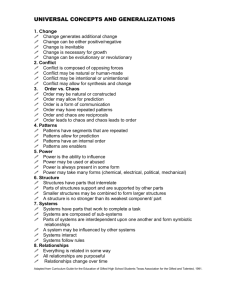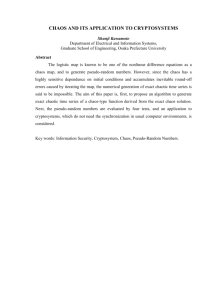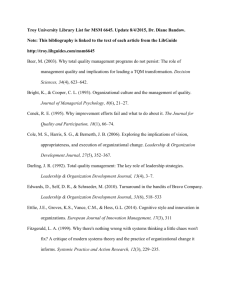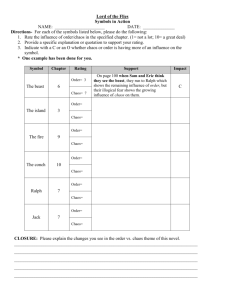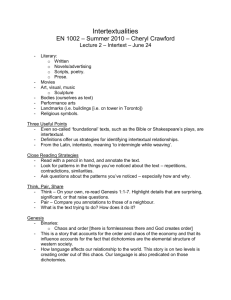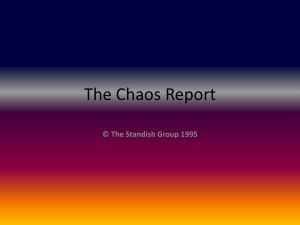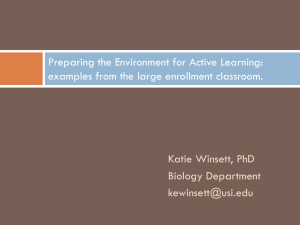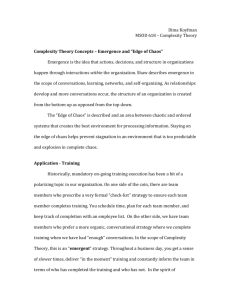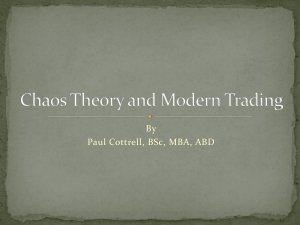Cultural epoch theory
advertisement
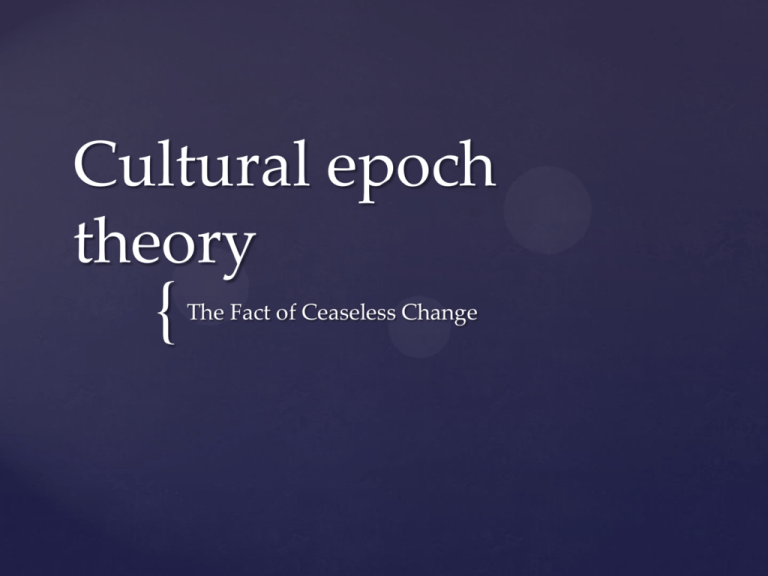
Cultural epoch
theory
{
The Fact of Ceaseless Change
Whatever conception of reality is held by the
great majority of people over a considerable
period of time. This is true even though the
majority may not be aware of any concept of
reality, or more probably, take it so much for
granted that they are not aware it is simply a
human idea, held on faith.
Define Culture
WHAT IS TRUTH?
WHAT IS BEAUTY?
WHAT IS LOVE?
WHAT IS JUSTICE?
WHAT IS FAITH?
Values that shape cultural
development
justice law & government
education form & curriculum in schools
religion temples & creeds
economy production & distribution of
goods & services
Based on concepts of REALITY and
accepted truth, we build the thought
structures that underlie institutions.
Chaos
Adjustment
Balance
Three steps every cultural
epoch goes through
1st step toward new epoch
New critics chisel away @ bedrock of established
culture by pointing out inconsistencies &
challenging the boundary limits of “reality.”
this collapse (of “old” patterns of belief, values,
and behavior) sweeps away old institutions,
theology, science, etc. + causes turmoil &
confusion.
Note that in the 1st stage of creation stories, deity
brings order to chaos
CHAOS
New and shocking ideas, moralities and beliefs
are introduced and discarded
Terrorists attack established governments
Civil strife and wars of conquest rage
Everyone damages the environment
Over everything looms the menace of nuclear
obliteration
Chaos in our world today
Some try to turn back the clock to more
peaceful days
Some seek refuge and security in
fundamentalist beliefs
Some stay distracted by their smartphones,
perhaps hoping all the problems will vanish
Coping with chaos
Innovative artists & thinkers (painters, scientists,
writers, composers, philosophers) respond to chaos
by suggesting/creating innovative new patterns for
culture that seem more in keeping with the
emerging spirit of the times.
Intellectuals (academics, government officials,
business executives, media, etc.) seek to distill &
resolve the tensions by designing new modes of
thought and new models that will provide a
framework for society.
Innovators posit a new design; intellectuals institute
workable models of these new expressions.
ADJUSTMENT
The artist is a person of greater sensitivity than
others, and with great skill in one medium.
The artist feels the tensions of the time
An artist will not rest until he or she has
explored this confusing experience and
discovered some meaning
Role of the artist in
adjustment
College students and faculty, government
officials, executives, etc.
They start reshaping the new ideas from the
artists into new philosophies of justice,
economics, religion, and the like, and build
concrete institutions out of their philosophies
Order emerges out of chaos
Role of the intellectuals
New and shocking ideas, moralities and beliefs
are introduced and discarded
Terrorists attack established governments
Civil strife and wars of conquest rage
Everyone damages the environment
Over everything looms the menace of nuclear
obliteration
What institutions have we
created to respond to
chaos today?
Order is reestablished when the new ideas of
reality, the philosophies underlying the basic
institutions, and the institutions themselves are
all in harmony.
Everything seems to be orderly and tidy &
people have a fundamental security that comes
from certainty.
Even in periods of balance, there is always an
undercurrent of new ideas brewing that will
eventually upend this sense of surety.
BALANCE
If balance lasts too long, life begins to get dull
The big jobs seem to be done and boredom,
decadence and deterioration may set in
Someone makes a new discovery (Einstein at
the beginning of the 20th century)
Satire, sarcasm, irony reign
Why don’t we stay in
balance?
Deciphering which phase of an epoch a culture is in
can only legitimately be accomplished in retrospect.
Remember that all 3 (chaos, adjustment, balance)
transpire concurrently and that their impact is a
matter of degree and not an absolute; in other
words, during periods of chaos, there will also be
some semblance of adjustment and balance going on
beneath the surface, and in turn, during periods that
are marked by a predominant sense of security,
there will be a chaotic element fermenting
underground. Generally, there remains an ongoing
process of adjustment that serves as a balancing
mechanism between any two extremes
Some cautions. . .
Give concrete examples of chaos, adjustment
and balance in our modern culture
Where do you think we are today?
Apply to today
